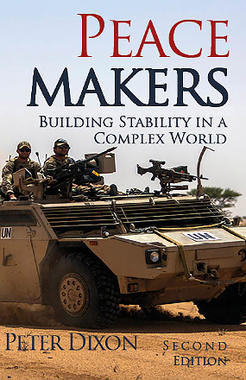 Author: Peter Dixon Genre: Christian Living When is war a just war? Should outsiders intervene in civil wars, and how? How can Christians effectively engage in resolving conflict? How do we understand relational peacebuilding and reconciliation? Peacemakers offers a moral framework on which to base our thinking about war and peace, undergirded by a solid confidence in God's sovereignty, as we face the uncertainty of the real world. 'I don't think we need to take responsibility for righting all the wrongs of the world like Superman.' he says. 'It is enough for us to do what we can, when we can, where we can.' Peacemakers evolves at another level too. As the author takes us down an icy Kabul street, or allows us to observe children celebrating a shaky peace in South Sudan, we experience first-hand the backcloth against which international peacebuilding takes place.  Reviewer: Tina Williams Peter Dixon attempts to answer the questions that so many believers have regarding peace and reconciliation between warring nations and as well as factions at civil war. He addresses the need for providing standards for Just War based on Augustine's arguments When conflict rises to the level to justify military action, it may be needed to save lives but can also result in unforeseen consequences. Dr. Dixon encourages Christians to involve themselves as individuals to affect change politically, through discussions with friends, and through prayer for those involved. Peter spends most of the book dealing, not with state-to-state conflict, but with the more prevalent conflicts raging within nations and people groups, such as Somalia, Sudan, and others. He does a great job of raising his reader's awareness of the difficulties and complexities involved in peacemaking. He suggests a three-level approach which could result in longer lasting peace through discussions and compromise, of which the warring parties have themselves take ownership. He does not over-simplify the issues at hand. Similar to those involved in community development and mercy ministries to impoverished areas, the solutions must involve multiple approaches and hearts willing to forgive and be longsuffering to those who have experienced trauma. At the close of each chapter, the author does an excellent job of turning our thoughts to how we can approach conflict and trauma from a biblical worldview. He reminds the reader that there will be a day when true peace and justice will be ushered in and that we can trust in the sovereignty of God. For readers of this book, I recommend Timothy Keller's book, Prodigal Prophet. It is a great pairing of books for how we as individuals can sort out the issue of peacemaking and loving our neighbors without compromising the gospel. Your comment will be posted after it is approved.
Leave a Reply. |
Categories
All
Archives
July 2024
|




 RSS Feed
RSS Feed
3/27/2019
0 Comments